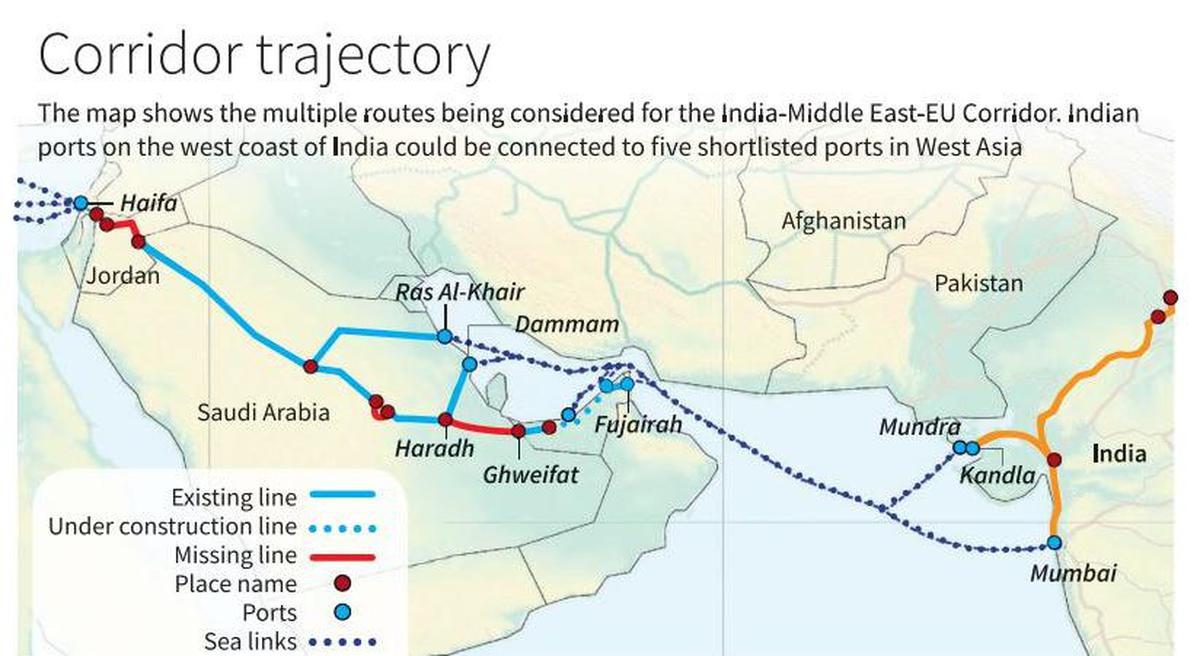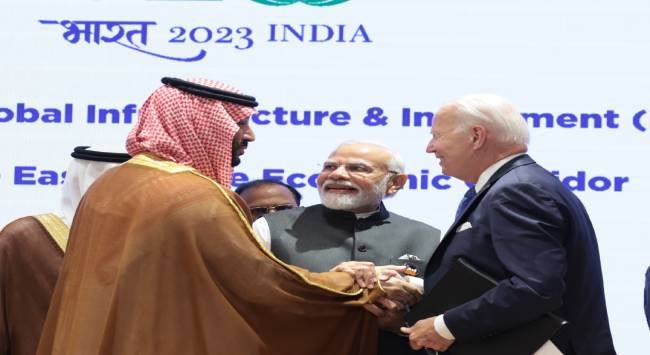The India-Middle East-Europe Economic Corridor:
Will Recent Challenges Create a Setback?
Vinod Rai
10 October 2023Summary
The announcement of the India-Middle East-Europe Economic Corridor on the sidelines of the G20 Summit in New Delhi in September 2023 seems to be of great geo-political significance. The corridor is expected to involve Indo-Saudi ship transit, rail linkages to the United Arab Emirates and further connections by rail. Although the project details are yet to be worked out, it is expected that if implemented as per schedule, it could be a game changer. However, several challenges, including the recent Hamas attack on Israel, could create setbacks to the process.
A significant announcement on the sidelines of the G20 summit held in September 2023 in New Delhi was the proposal to set up a multimodal rail, shipping and energy corridor between India and Europe via the Middle East, that is, the India-Middle East-Europe Corridor (IMEC). The corridor will include India, Saudi Arabia, the United Arab Emirates (UAE), Jordan, Israel and the European Union (EU). It is expected to help boost trade, deliver energy resources and improve digital connectivity. While the final contours of the project are yet to emerge, the corridor is likely to include an India-Saudi ship transit, and railway links to the UAE and Jordan, with shipment moving by sea to Turkey and further by rail.
Map 1: The India-Middle East-Europe Corridors: Corridor Trajectory

Source: The Hindu.
Multiple routes are being considered to reduce freight load on the chosen route. The ports that are likely to be connected on the west coast of India are Mundra (Gujarat), Kandla (Gujarat) and Jawaharlal Nehru Port Trust (Navi Mumbai). In the Middle East, at least five ports have been shortlisted to be connected to the Indian ports, including Fujairah, Jebel Ali, and Abu Dhabi in the UAE, as well as Dammam and Ras Al Khair in Saudi Arabia.
The project will involve building a railway line across the Arabian Peninsula through the UAE and Saudi Arabia. This railway route, primarily traversing the Middle East, includes plans for laying electricity and high-speed data cables and clean hydrogen pipelines. It will also provide reliable and cost-effective cross-border ship-to-rail transit, complementing existing maritime and road transport routes. The corridor is expected to attract more Asian countries, boosting manufacturing, food security and supply chains within its sphere of influence.
The project has been viewed as an alternative to China’s Belt and Road Initiative (BRI), which is in its 10th year and has countries in South Asia, the Middle East and Africa participating in it. The announcement of the IMEC and the possible stagnation of Chinese investments in the BRI seems to have persuaded Italy to cease its participation in the BRI. Italy’s Prime Minister Giorgia Meloni hinted in this direction during the G20 Leaders’ Summit.
For India, the IMEC offers tremendous advantages. India’s most significant inadequacy is the Pakistani land mass to its west, which obstructs any attempt by India to establish land connectivity with West Asia. Pakistan nixes every proposal for connectivity. The IMEC will help India overcome this barrier in establishing connectivity with Afghanistan, Iran and Central Asia. Further, India has long desired to deepen its strategic engagement with the Middle East countries. The current National Democratic Alliance (NDA) government in India has established strong links with some countries, such as the UAE and Saudi Arabia. This corridor will provide an opportunity to establish closer links through better connectivity. Unlike the BRI, wherein China has provided the bulk of the investment, in the IMEC, there appears to be a good buy-in from the European countries for infrastructure development in this region. The EU had earmarked €300 million(S$433 million) for infrastructure spending worldwide during 2021-27. Its support for the new corridor will make the EU a major stakeholder in integrating India with the Middle East and Europe.
It need not be emphasised that India, Europe and the United States (US) are attempting to create an alternative to the China-dominated BRI. This corridor will most certainly offer competition to the Chinese initiative in all respects. With the broad sweep of countries that have offered support to the IMEC, it seems that long-term financial and ecological sustainability, which has been the most serious inadequacies of the BRI, will not pose much of a risk.
Undeniably, a project of such massive financial commitment involving many countries having their own resource challenges besides economic viability issues will require a tremendous amount of coordination and political will to implement. The US and the EU are facing protracted difficulties due to the long-drawn conflict in Ukraine, which does not seem to be ending soon. The German economy, which has been the engine of European growth, has shown signs of stagnation. The fact that Iran and Turkey are not a part of the project may pose its own challenges, especially since Iran’s Chabahar port has been facing headwinds due to continuing US sanctions. The greater concern now is the recent Hamas attack on Israel, which is bound to see retaliation and protracted hostilities. The US has been engaged in backdoor negotiations to normalise relations between Saudi Arabia and Israel such that Saudi Arabia would get Western assistance to build a rail network to obtain access to Israel’s Haifa port through Jordan. The hostilities will be a setback to the progress made on the deal.
The signatories are scheduled to meet in November 2023 to announce an action plan. An investment of around US$17 billion (S$23 billion) is required and around 100,000 jobs need to be created to complete the scheme. The result of this meeting is being anxiously awaited to gauge the depth of commitment of the different parties.
. . . . .
Mr Vinod Rai is a Distinguished Visiting Research Fellow at the Institute of South Asian Studies (ISAS), an autonomous research institute in the National University of Singapore (NUS). He is a former Comptroller and Auditor General of India. He can be contacted at isasvr@nus.edu.sg. The author bears full responsibility for the facts cited and opinions expressed in this paper.
Pic Credit: Airnewsalerts’ Twitter Account
-
 More From :
More From :
-
 Tags :
Tags :
-
 Download PDF
Download PDF



